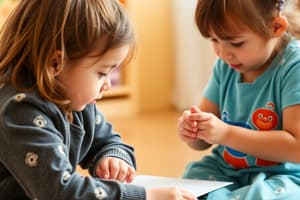Podcast
Questions and Answers
What is a significant influence on a child's life, shaping their personal, social, and emotional development?
What is a significant influence on a child's life, shaping their personal, social, and emotional development?
- School administrators
- Parents
- Teachers
- Childhood friends (correct)
How do childhood friendships contribute to cognitive development?
How do childhood friendships contribute to cognitive development?
- By discouraging communication
- By fostering jealousy
- By promoting trust and cooperation (correct)
- By encouraging competition
What can parents and teachers do to support children through challenges in friendships?
What can parents and teachers do to support children through challenges in friendships?
- Encourage healthy coping strategies and resilience (correct)
- Avoid discussing friendship challenges with children
- Discourage children from making friends
- Limit children's social interactions
Children who have strong friendships tend to exhibit which of the following characteristics?
Children who have strong friendships tend to exhibit which of the following characteristics?
What role do school experiences and childhood friendships play in shaping a child's development?
What role do school experiences and childhood friendships play in shaping a child's development?
What is one benefit of school enrollment on children's cognitive development?
What is one benefit of school enrollment on children's cognitive development?
Which social skills can children learn through school activities?
Which social skills can children learn through school activities?
What foundational skills can learning to read and write in school contribute to?
What foundational skills can learning to read and write in school contribute to?
Which common challenge might children face in school according to the text?
Which common challenge might children face in school according to the text?
How do childhood friendships contribute to a child's social development?
How do childhood friendships contribute to a child's social development?
Flashcards are hidden until you start studying
Study Notes
Exploring Childhood: School Experiences and Friendships
Childhood is a time of growth, learning, and shaping one's identity. Two essential aspects of this formative period are school experiences and the development of childhood friendships. Let's delve into these aspects to better understand their impact on a child's life.
School Experiences
School serves as a cornerstone in every child's development. The classroom provides an environment for children to learn both academically and socially.
Academic Growth
School enrollment is closely linked to cognitive development and improved academic outcomes. Interactions with peers and teachers in the classroom allow children to expand their knowledge and acquire new skills. For instance, learning to read and write helps lay the foundation for language development, critical thinking, and problem-solving skills.
Social Development
School activities offer opportunities for children to learn essential social skills such as cooperation, empathy, and communication. These skills are crucial for building strong relationships, forming bonds, and developing a positive sense of self. As children interact with their peers, they learn to navigate social dynamics and develop strategies to resolve conflicts.
Challenges
Not all school experiences are positive or easy for children. Bullying, discrimination, and lack of resources are three common challenges that children may face in school. These obstacles can negatively impact a child's self-esteem and academic performance. It's essential that parents, teachers, and school administrators work together to create a safe and inclusive environment that supports every child's growth and development.
Childhood Friends
Childhood friends often have a significant influence on a child's life, shaping their personal, social, and emotional development. As children spend time with their friends, they learn to trust, communicate, and cooperate with one another.
Social and Emotional Development
Childhood friendships foster social and emotional development, helping children to build self-confidence, empathy, and resilience. When children interact with their friends, they learn to navigate social dynamics, resolve conflicts, and develop coping strategies. For instance, children who have strong friendships tend to exhibit increased levels of self-esteem, higher social competence, and better emotional regulation.
Cognitive Development
Childhood friendships can also support cognitive development by encouraging children to engage in cooperative learning activities. For instance, when children work together to solve problems, they learn to think critically, communicate effectively, and develop a growth mindset.
Challenges
Not all childhood friendships are positive, and children may encounter challenges such as betrayal, jealousy, and competition. It's essential that parents and teachers support children through these challenges by helping them develop healthy coping strategies and resilience. For instance, parents may encourage children to engage in activities that foster friendship, such as playing sports, joining clubs, or attending social events.
In conclusion, childhood is a time of growth, learning, and development. School experiences and childhood friendships play essential roles in shaping a child's personal, social, and emotional development. By creating safe and inclusive environments at school and home, we can help children thrive and reach their full potential.
Studying That Suits You
Use AI to generate personalized quizzes and flashcards to suit your learning preferences.




